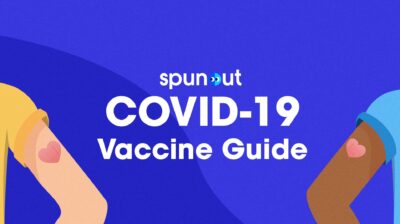How to talk to your family about the COVID-19 vaccine
When having discussions about COVID-19 vaccination, respect, empathy and patience are key.

If you are aged 16 and over, you are now able to get the COVID-19 vaccine. You have the right to decide whether you want to receive the vaccine. When making your decision, it is important to get your information from reliable, factual sources.
How to have conversations around COVID-19 vaccination
While you might have made your decision about the vaccine, it is possible that your family members don’t share your views. Conversations about COVID-19 vaccination can be challenging if those involved don’t agree with one another. When having these discussions, respect, empathy and patience are key.
Try not to shame anyone
Respect lies at the heart of any healthy conversation. If you want to discuss the COVID-19 vaccine with family members, it’s important that everyone remains respectful towards one another. You can do this by simply listening to what someone else has to say. Even if you don’t agree with their views, try not to shame them, dismiss them or make them feel guilty when they share them with you. It is much more productive to acknowledge how they are feeling, without necessarily agreeing with them.
Say: “It’s completely fine and normal to have questions about getting the vaccine.”
Use “I-statements”
Using “I-statements” when you are speaking is another way to encourage respectful communication. “I-statements” show that, even though you may not agree with the other person’s words and actions, you are not blaming them for how they have made you feel.
The purpose of an “I-statement” is to express how you feel without making the other person responsible for those feelings. It is important to use specific emotions when voicing these statements. For example, ‘I feel anxious when you won’t talk to me about your vaccine concerns’. Try to avoid using “you-statements” in disguise. For example, a phrase like ‘I feel like you are taking me for granted’ places blame on the other person and does not express any specific emotion.
Say: “I felt upset when you didn’t talk to me about your decision.”
Ask open-ended questions
Open-ended questions are questions that do not have a yes or no answer. By asking your family member open-ended questions about their vaccine views, you will be able to gain a better understanding of what has informed their decisions. Again, this doesn’t mean you have to agree with them. However, it will help you to have a more productive conversation.
Say: “Can I ask what you are worried about?” or “Can you explain to me why you think getting/not getting the vaccine is important?”
Share your personal feelings
Communication is a two-way street. In any conversation, it is important that everyone takes the time to listen as well as share. If you feel comfortable doing so, consider sharing your own feelings around the COVID-19 vaccine with your family member. If you want to get the vaccine, tell them why you have made this decision. Perhaps you hope to be able to visit family and friends again, or you’re eager to resume sports and activities that were postponed due to the pandemic. Maybe you are concerned about the health risks of COVID-19 and want to protect yourself and those around you from the virus. Figure out what your why is and try to explain it to them, without trying to force them to agree with you.
If you have already been vaccinated, share your experience with your family member. Talk to them about what the process involved and how you feel now that it is behind you. It is possible that you also had concerns about the vaccine at one point. If so, tell your family member about what helped to reassure you.
It is possible that your family member wants you to get the COVID-19 vaccine and you don’t. Anyone over 16 can consent to the vaccine, meaning that nobody can force you to receive or not receive a vaccine. However, it is important to consult factual and reliable information before making your decision.
Say: “I decided to get vaccinated to protect myself and those around me.” or “I really miss meeting friends and family and getting vaccinated will bring me closer to being able to do so safely.”
Support one another with fact-finding
If your family member is uncertain or fearful about the COVID-19 vaccine, you can help them to find answers to their questions. If you have read the spunout vaccine article, you might be able to answer their questions yourself. However, if you don’t know the answers, that is ok. You can still support your family member by offering to help them to look for information. If they accept, it is important to get information from reliable sources such as the HSE website. You can also speak with your GP or the person giving you a vaccination about any questions or concerns.
If your family member wants to get the vaccine but is unable or unwilling to attend a vaccination centre, you can let them know that there are other options available to them. For example, they can book a vaccination appointment in a participating local pharmacy. This might be a more accessible and comfortable option for some people. It is also possible to attend a walk-in appointment at one of the vaccine clinics around the country. You do not need to register online to attend a walk-in clinic.
Say: “There is a lot of misinformation on the internet and it can be hard to know where to find reliable information. Do you want me to help you to find what you are looking for? I would love to learn more too.” and “I understand that going to a large vaccination centre makes you nervous. Would you be more comfortable going to a small pharmacy instead?”
Take care of yourself
Talking about the COVID-19 vaccine isn’t always easy, so it is important to take care of yourself. If your family member is not being respectful of you, you are feeling tired or you need to step away from the conversation for any other reason, that is completely ok. You can always come back to the conversation another time once everyone feels comfortable doing so.
If you are feeling upset or anxious after talking to your family member about the vaccine, it might be a good idea to speak to someone such as a friend, another family member or a counsellor. You can also always contact our text support service 50808. Find out more below.
Say: “I am feeling quite tired so I think we should return to this conversation another time.”
Remember, it is not your job to convince your family member to agree with you, and they cannot force you to change your mind either. However, by remaining respectful, supportive and focusing on the facts, you can help one another to make a well-informed decision about the COVID-19 vaccine.
Feeling overwhelmed and want to talk to someone?
- Get anonymous support 24/7 with our text message support service
- Connect with a trained volunteer who will listen to you, and help you to move forward feeling better
- Whatsapp us now or free-text SPUNOUT to 50808 to begin.
- Find out more about our text message support service
If you are a customer of the 48 or An Post network or cannot get through using the ‘50808’ short code please text HELLO to 086 1800 280 (standard message rates may apply). Some smaller networks do not support short codes like ‘50808’.
Need more information, advice or guidance?
We offer information, advice and guidance about the issues that matter to you. Our online Youth Information Chat service is for 16 to 25 year olds and is available Monday to Friday, 4pm to 8pm (excluding Bank Holidays).





